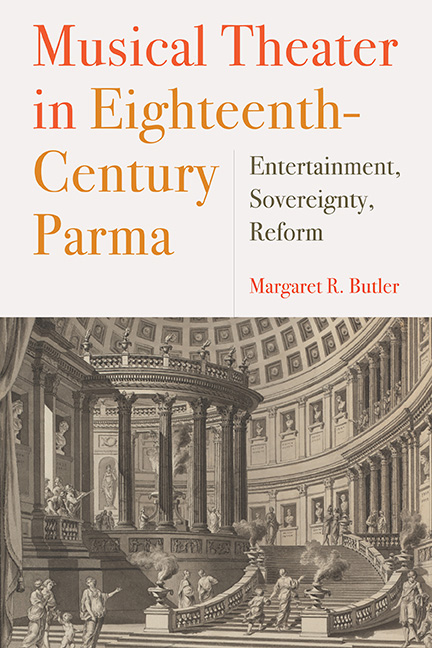Book contents
- Frontmatter
- Dedication
- Contents
- List of Illustrations
- Acknowledgments
- List of Abbreviations
- Notes to the Reader
- Introduction: The Genre Problem: Reform as Continuum and Brand
- 1 The Genesis of Parma's Projet
- 2 Behind the Scenes: Production and Management at the Teatro Ducale
- 3 The French Entertainments: Creation, Publicity, Propaganda
- 4 Moving On While Looking Back: Traetta's First Parma Operas
- 5 The End of the End of Reform: The Wedding, the French Ambassador's Opera, Traetta's Departure
- Conclusion: Reform Revisited
- Appendix: General Chronology
- Notes
- Bibliography
- Index
3 - The French Entertainments: Creation, Publicity, Propaganda
Published online by Cambridge University Press: 24 October 2019
- Frontmatter
- Dedication
- Contents
- List of Illustrations
- Acknowledgments
- List of Abbreviations
- Notes to the Reader
- Introduction: The Genre Problem: Reform as Continuum and Brand
- 1 The Genesis of Parma's Projet
- 2 Behind the Scenes: Production and Management at the Teatro Ducale
- 3 The French Entertainments: Creation, Publicity, Propaganda
- 4 Moving On While Looking Back: Traetta's First Parma Operas
- 5 The End of the End of Reform: The Wedding, the French Ambassador's Opera, Traetta's Departure
- Conclusion: Reform Revisited
- Appendix: General Chronology
- Notes
- Bibliography
- Index
Summary
Parma's full immersion in French music and theater set the stage for Traetta's operas. Starting in 1756 the troupe gave a broad range of the era's popular musical-theatrical genres—some two hundred works, including about twentythree operas and ballets by Jean-Philippe Rameau and other French composers. The adaptation process scholars have observed in Traetta's operas actually began with the French operas, as evidence connected with these four French works given in Parma demonstrates.
Zélindor, roi des silphes / Zelindor, re de’ silfi
Divertissement/balletto; Rebel and Francoeur / Moncrif (1745; 1751)
Autumn 1757
Les Incas du Pérou / Gl'Incà del Perù from Les Indes galantes
Opéra-ballet; Rameau / Fuzelier (1735)
18 December 1757
Castor et Pollux / Castore e Polluce
Tragédie lyrique; Rameau / Bernard (1737; 1754)
6 December 1758
Anacreonte
Balletto; Rameau / Bernard
Likely adapted from Anacréon, third entrée from the opéra-ballet Les surprises de l'Amour (1748; 1757)
Carnival 1759
These French works illuminate Parma's adaptation process particularly well. Three of them include singing—the divertissement Zélindor, roi des silphes by Francoeur and Rebel, titled Zelindor, re de’ silfi in Parma; the entrée Les Incas du Pérou from the opéra-ballet Les Indes galantes by Rameau, titled Gl'Incà del Perù in Parma; the tragédie lyrique Castor et Pollux by Rameau, titled Castore e Polluce in Parma—and one of them is entirely danced—the balletto Anacreonte, a newly created work based on the entrée Anacréon from Rameau's opéra-ballet Les surprises de l'Amour. Extant sources document the Parmesan transformations of these works the most thoroughly. Parma's French entertainments—the sung ones performed by the troupe's French singers, in the original French—were given in private performances for the court. Some of them were also presented to the public at the city's Teatro Ducale, although actually how many received public performances may never be known for certain. Printed librettos for the four works above are extant and have up to now never been examined. My comparison of the Parma librettos for Zelindor, re de’ silfi, Gl'Incà del Perù, Castore e Polluce, and Anacreonte, with librettos from the Paris revivals closest to the dates of the Parmesan productions reveals significant alterations to the texts. A libretto survives for a fifth work, Mondonville's Titon et l'Aurora (1759) as well, although the text for Parma is not significantly changed from the original.
- Type
- Chapter
- Information
- Musical Theater in Eighteenth-Century ParmaEntertainment, Sovereignty, Reform, pp. 53 - 84Publisher: Boydell & BrewerPrint publication year: 2019



